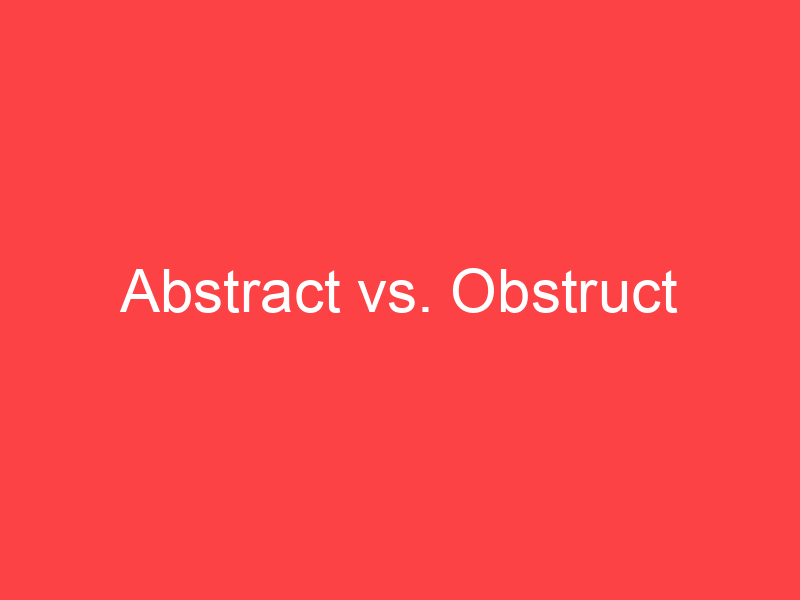-
Abstract (noun)
An abridgement or summary of a longer publication. First attested around 1350 to 1470.page=10
-
Abstract (noun)
Something that concentrates in itself the qualities of a larger item, or multiple items. First attested in the mid 16th century.
-
Abstract (noun)
Concentrated essence of a product.
-
Abstract (noun)
An abstract term; that which is abstract. First attested in the mid 16th century.
-
Abstract (noun)
The theoretical way of looking at things; something that exists only in idealized form. First attested in the early 17th century.
-
Abstract (noun)
An abstract work of art. First attested in the early 20th century.
-
Abstract (noun)
A summary title of the key points detailing a tract of land, for ownership; abstract of title.
-
Abstract (adjective)
Derived; extracted. Attested from around 1350 to 1470 until the late 15th century.
-
Abstract (adjective)
Drawn away; removed from; apart from; separate. First attested around 1350 to 1470.
-
Abstract (adjective)
Expressing a property or attribute separately of an object that is considered to be inherent to that object. First attested around 1350 to 1470.
-
Abstract (adjective)
Considered apart from any application to a particular object; not concrete; ideal; non-specific; general, as opposed to specific. First attested around 1350 to 1470.
-
Abstract (adjective)
Difficult to understand; abstruse; hard to conceptualize. First attested around 1350 to 1470.
-
Abstract (adjective)
Absent-minded. First attested in the early 16th century.
-
Abstract (adjective)
Pertaining to the formal aspect of art, such as the lines, colors, shapes, and the relationships among them. First attested in the mid 19th century.
-
Abstract (adjective)
Free from representational qualities, in particular the non-representational styles of the 20th century. First attested in the mid 19th century.
-
Abstract (adjective)
Absolute.
-
Abstract (adjective)
Insufficiently factual.page=8
-
Abstract (adjective)
Apart from practice or reality; vague; theoretical; impersonal; not applied.
-
Abstract (adjective)
As a noun, denoting an intangible as opposed to an object, place, or person.
-
Abstract (adjective)
Of a class in object-oriented programming, being a partial basis for subclasses rather than a complete template for objects.
-
Abstract (verb)
To separate; to disengage. First attested around 1350 to 1470.
-
Abstract (verb)
To remove; to take away; withdraw. First attested in the late 15th century.
-
Abstract (verb)
To steal; to take away; to remove without permission. First attested in the late 15th century.
-
Abstract (verb)
To summarize; to abridge; to epitomize. First attested in the late 16th century.
-
Abstract (verb)
To extract by means of distillation. Attested from the early 17th century until the early 18th century.
-
Abstract (verb)
To consider abstractly; to contemplate separately or by itself; to consider theoretically; to look at as a general quality. First attested in the early 17th century.
-
Abstract (verb)
To withdraw oneself; to retire. First attested in the mid 17th century.
-
Abstract (verb)
To draw off (interest or attention).
“He was wholly abstracted by other objects.”
-
Abstract (verb)
To perform the process of abstraction.
-
Abstract (verb)
To create abstractions.
-
Abstract (verb)
To produce an abstraction, usually by refactoring existing code. Generally used with “out”.
“He abstracted out the square root function.”
-
Obstruct (verb)
To block or fill (a passage) with obstacles or an obstacle. block
-
Obstruct (verb)
To impede, retard, or interfere with; hinder.
“They obstructed my progress.”
-
Obstruct (verb)
To get in the way of so as to hide from sight.
-
Obstruct (verb)
block (an opening, path, road, etc.); be or get in the way of
“she was obstructing the entrance”
-
Obstruct (verb)
prevent or hinder (movement or someone or something in motion)
“they had to alter the course of the stream and obstruct the natural flow of the water”
-
Obstruct (verb)
deliberately make (something) difficult
“fears that the regime would obstruct the distribution of food”
-
Obstruct (verb)
commit the offence of intentionally hindering (a police officer)
“the appellants were arrested, and later convicted of obstructing the police”
-
Obstruct (verb)
(in various sports) impede (a player in the opposing team) in a manner which constitutes an offence
“an indirect free kick is awarded for intentionally obstructing an opponent”

